- Home
- John Kendrick Bangs
Alice In Blunderland Page 3
Alice In Blunderland Read online
Page 3
"It most certainly does," said the White Knight gravely, and in such tones of finality that Alice did not venture to dispute his assertion.
"We're all agreed upon that point," said the Hatter. "But there were complaints of course. Some people, mostly capitalists who were rich enough to have libraries of their own, complained that they couldn't read nights because the gas wouldn't light. I replied that if they wanted to read they could go to the Public Library, where there were oil lamps, and electric lights. Besides reading at night is bad for the eyes. Others objected that they couldn't see to go to bed. The answer to that was simple enough. People don't need to see to go to bed. They may need to see when they are dressing in the morning, but when they go to bed all they have to do is to take their clothes off and go, and I added that people who didn't know enough to do that had better have nurses. Finally some of the chief kickers got up a mass-meeting and protested that the new gas wasn't gas at all, and in view of that fact refused to pay their gas tax."
"Oho!" said Alice. "That was pretty serious I should think."
"It seemed so at first," said the Hatter, "but just then the beauty of the Municipal Ownership scheme stepped in. I called a special meeting of the Common Council and they settled the question once for all."
"Good!" cried Alice "How did they do it?"
"They passed a resolution," said the Hatter, "unanimously declaring the aromatic hot-air to be gas of the most excellent quality, and made it a misdemeanor for anybody to say that it wasn't. I signed the ordinance and from that minute on our gas was gas by law."
"Still," said Alice, "those people had already said it wasn't. Did they back down?"
"Most of 'em did," laughed the Hatter. "And the rest were fined $500 apiece and sent to jail for six months. You see we made the law sufficiently retroactive to grab the whole bunch. Since then there have been no complaints."
Whereupon the Hatter invited Alice to stroll through the gas-plant with him, which the little girl did, and declared it later to have been sweeter than a walk through a rose-garden, which causes me to believe that the Mayor's scheme was a pretty wonderful one after all, and quite worthy of a Hatter thrust by the vagaries of politics into the difficult business of gas making.
CHAPTER IV
THE CITY-OWNED POLICE
After Alice and her companions had enjoyed the aromatic delights of the Blunderland Gas Plant the Hatter and his Cabinet went into executive session for a few hours to decide where they should go next. The interests of Blunderland were so varied that this was a somewhat difficult matter to settle, especially as Mr. Alderman March Hare, who was a great stickler for the rights of the honourable body to which he belonged, wished to have the question referred to a special meeting of the Common Council. The White Knight as Corporation Counsel, however, advised the Hatter that there was no warrant in law compelling him to accede to the March Hare's demand.
"The Municipal Ownership of Rubbernecks act has not yet been passed," he observed. "Consequently visitors to our City can be shown about in any way in which the party in charge chooses to choose."
"All right if you say so," said March Hare coldly. "Only I'd like to have that opinion in writing. Public officials nowadays are too prune to deny——"
"Prone, I guess you mean," laughed the Hatter gleefully.
"I prefer prune," said the March Hare, with dignity. "Public officials are too prune nowadays to deny what they say in private conversation to encourage me to take any chances."
"Certainly," returned the White Knight. "I'll write it out for you with pleasure." Whereupon, taking a piece of chalk from his pocket, he wrote with it on the side of a convenient gas tank the following opinion:
IN RE WHAT TO DO NEXT
Opinion 7,543,467,223. Liber 29. Gas Tank No. 6
You can go to the People's Shoe Shop,
Or down to the new Town Pump.
You can visit the Civic Glue Shop,
Or call on the Public Chump.
You can visit the Social Rooster,
Or sample Municipal Cheese—
In short you can do what you choose ter,
And go where you dee dash please.
(Signed) JOHN DOE WHITE KNIGHT,
Copperation Counsel.
Meanwhile Alice had been turned over to the Chief of Police to be cared for, and was charmed to discover that that individual was none other than her old friend the Dormouse whom she had met in her trip through Wonderland at the Hatter's tea-party.
"How did you ever come to be Chief of Police?" she cried delightedly, as she recognised him.
"I'm the soundest sleeper in town," he replied with a yawn, "so they made me head of the force. You see, young lady, the great trouble with the average policeman is that he's too wide-awake, and that leads to graft. When the Hatter's Municipal Police Commission looked into the question they found that the Cop who spent most of his time asleep spent less of his time clubbing people who wouldn't whack up with him on the profits of their business. Every ossifer who has been convicted of petty larceny in the past, the records show, has been a fellow who stayed awake most of the time, and no ossifer has ever yet been known to go in for graft or get a record for clubbing innocent highwaymen over the head while he was asleep either on a Park Bench, or in an alleyway. Consequently, says they, Mr. Dormouse who wakes up only on every fifth Thursday in February will make the best Police ossifer in the bunch, and being the best had ought to be chose chief. Hence accordingly, it became thus. Moreover I am a champion Tea Drinker."
"What's that got to do with it?" demanded Alice.
"Everything," said the Dormouse, rubbing his eyes sleepily. "Every blessed thing. Tea Drinking is one of our hardest duties under the new system providing for the Municipal Ownership of Everything in Sight Including the Cop on the Corner. You see when the City grabbed up the Bakeries, and the Trolleys, and the Grand Opera House, and the Condensed Milk Factory, and the Saw Mills, and the Breakfast Food Jungles, all envy, hatred and malice disappeared. Everybody loved his neighbour better than he did himself or his wife's family, and consequently hence there was therefore no crime, which left the Policeman out of a job. The only Burglars left in town were the regularly appointed official safecrackers representing the Municipal Ownership of Petty and Grand Larceny. The only gambling houses left were under the direct supervision of the Mayor acting ex-officio and the Chairman of the Aldermanic Committee on Faro and Roulette. The Game of Bunco became a duly authorised official diversion under control of the Tax Assessors, and the Town Toper, being elected by popular vote, could get as leery as he pleased by public consent. Life Insurance Agents became likewise Public Servants under the General Ordinance of 1905 starting the Civic Tontine Parlours where people were compelled to buy Life Insurance from the City itself at so much a yard."
"A yard?" cried Alice.
"Yep," yawned the Dormouse. "Policies were issued anywhere from three inches to a yard long, each inch representing a year. If you bought a mile of Life Insurance you were insured for as many years as there are inches in a mile. I never could stay awake long enough to figure out how much that is, but it's several years."
"But what did the Agents have to do?" asked Alice. "If people had to take it——"
"They went out and grabbed delinquents," said the Dormouse.
"I shouldn't think people would need life insurance for the benefit of their families if everybody has everything he wants in Blunderland," put in Alice.
"They don't," said the Dormouse, rapping his head with his club to keep from dropping off to sleep. "It ain't for the benefit of their families—it's for the benefit of the City. A City like this can use benefits to great advantages most all the time. But you see the results of Municipalising all sorts of crime from straight burglary up to life insurance resulted in the Police having nothing to do. There wasn't anybody to arrest, or to quell, or to club, and so they turned us into a social organisation and that's where Tea Drinking comes in strong. Every afternoon at five o clock, tea is s
erved on every corner in Blunderland by the Policeman on beat. They have become quite a public function, but they're a trifle hard on the police who don't care for tea, because we have to be very polite and take it with everybody who comes up, and be nice and chatty into the bargain. In addition to this we are required to go to dances and take care of the wall-flowers and make ourselves generally agreeable. It is one of the laws of Blunderland that all girls are born free and equal in the pursuit of life, liberty and german favours, and when any of the Terpsichorean Force finds a girl with red hair and snub nose with freckles on it decorating the wall and being neglected at a cotillion, it is his duty to plunge in and either dance with her himself, or put some Willieboy under arrest until he calls her out and gives her the time of her life. You can't imagine what wonderful results this Municipal Control of that social situation has done in the line of popularising plain girls."
"It sounds very interesting," Alice ventured. "I should think the girls would like it."
"They do," said the Dormouse. "The only objection to it comes from the Willieboys, but nobody cares much what they think because there aren't many of them that can think."
"And is that all you do?" asked Alice.
"Oh, no indeed," said the Dormouse. "We keep reserves for Bridge Parties at the Station all the time, so that if any taxpayer ever needs a fourth hand to make up a game all he has to do is to ring up headquarters and get an ossifer to come up and play. In addition to this we look after old ladies who want to go shopping and aren't strong enough to break through the rush line at the bargain counters. And then once in a while somebody's baby will wake up at three o'clock in the morning and demand the moon, and we go up and attend to it."
"What?" cried Alice in amazement. "You don't mean to say you give it the moon?"
"Not exactly," said the Dormouse. "We just promise to give it. That's one of the strong points about Municipal Ownership. It's the easiest system to make promises under you ever knew. You can promise anything, and later on if you don't make good you can promise something better, and so on. It works very well in a great many places."
"But that isn't really what we go up to the house for. We go up to relieve the poor tired parents who have been working hard all day and are too weary to walk up and down the floor with the baby. We respond immediately to the call, grab up the baby and walk the floor with him until he is quiet again. Once last winter a chap with three pairs of twins six months, a year and a half, and three years old respectively, had to send for the patrol wagon. All six of 'em waked up and began to squall at once and we sent seven ossifers and a sergeant up to look after them. They had to parade around that house from 2 A. M. until seven-thirty before those babies quit yelling."
Just at this moment the Dormouse was interrupted in his story by a raggedly dressed old man on a pair of crutches who begged an alms of him.
"Only a dollar, sir," he asked piteously. "Only a dollar to relieve a terrible case of distress."
"Certainly, Simpkins," said the Dormouse kindly. "I—well I'll be jiggered—" he added, feeling through his pockets. "I must have left my money at home. Maybe this young lady can help you out. Miss Alice, permit me to introduce you to Simpkins. He's the most successful beggar in nineteen counties."
"Glad to meet you," said Alice, shaking hands with Simpkins.
"You couldn't spare a dollar, could you, Miss?" whined the Beggar. "It will relieve a terrible case of distress Ma'am.
"Why—yes," said Alice, suddenly remembering that she had a silver dollar in her pocket. "Here it is."
And she handed it to Simpkins who thanked her profusely.
"How's business?" asked the Dormouse.
"Fine," said Simpkins, executing a jig. "I've collected $800 since eleven o'clock this morning."
Whereupon, forgetting his crutches, he made off up the street with the agility of an antelope. Alice gazed after him in wonder.
"I—I didn't suppose you had any beggars in Blunderland," said she.
"He's the only one," replied the Dormouse. "He's the official Beggar of the Town. He gets $25,000 in Tenth Deferred Reorganisation Certificates a year—which, if the Certificates pay ten cents on the dollar, as we hope, will turn out to be a good salary in the end."
"But why does he beg? Who gets the money?" asked Alice.
"The City," said the Dormouse. "Once in a while when the Printing Plant gets clogged up with large orders of Bonds for our various enterprises, the City has to get hold of a few dollars of real money, so they send Simpkins out for it. I believe he's out to-day trying to raise the interest on the Sixteenth Mortgage Extension Bonds on the Municipal Cigarette Plant purchased year before last. It's ten months overdue and the former owners have asked the Government to smoke up."
"Oh!" said Alice. "Is the Printing Plant clogged up?"
"Unmercifully," said the Dormouse. "Not to say teetotally. They're preparing their Christmas issues in Magazine form, and that means a terrible lot of extra work. I don't believe the way things look now that the City will be able to print the money for last January's payroll until somewhere around the next Fourth of July, and if that's the case poor old Simpkins will either have to work overtime or get a half-dozen Deputy Assistant Beggars to put the town in funds. I'm expecting to have the Police put on that job at any minute."
Alice was silent for a moment, and the Dormouse went on.
"What do you think of the Municipal Ownership of the Police idea?" he asked.
"It's fine," said Alice. "But I thought all Cities owned their police force."
"A great many people think that," laughed the Dormouse. "But it isn't so."
"It is in New York and Chicago—I heard my Papa say so once," said Alice.
Again the Dormouse laughed.
"Well," he said. "I don't want to cast any asparagus on your father's intelligence, but he's wrong. The Police may own New York and Chicago, but New York and Chicago don't own the police—not by a long shot."
"Who does, then?" demanded Alice.
"The Lord only knows," laughed the Dormouse. "Some people say John Doe, and other people say the Man Higher Up, but which it is, or who either of 'em may be, I haven't the slightest idea. Maybe they belong to the Copper Trust."
And then with a sly wink at the little maid the Dormouse turned over and went to sleep.
CHAPTER V
THE MUNICIPAPHONE
Armed with the Copperation Counsel's opinion authorising him to do whatever he pleased next, the Hatter decided that he would give Alice a demonstration of the workings of the Municipaphone.
"Which," said he proudly, "I consider to be the most Democraticising thing I have ever invented. You can talk all you please about Universal Brotherhood, Unlimited Sisterhood, and the Infinity of Unclehood, but all of these movements put together haven't done as much to promote the equality of everybody as that Municipaphone idea of mine."
Alice thought the Cheshire Cat's grin expanded slightly as the Hatter spoke, but she was not sure, although he most assuredly did wink at her.
"I should admire to see it," she said. "What is it, just?"
"It is the result of the Municipal Ownership of the Telephone," returned the Hatter proudly. "We have taken over everything that works by electricity—electric lighting, the telegraph, the telephone——"
"Even the thunder and lightning," interrupted the White Knight. "And under our management everything runs so smoothly that even the lightning doesn't strike any more. That's a great thing in Municipal Ownership. There aren't any more strikes under it."
"What he says is true, my child," said the Hatter, "and in time we expect to get the thunder itself under control so that it will serve some useful purpose—I don't know yet exactly what, but I am having experiments made in storage batteries which will catch and hold the thunder with the idea of saving the noise it makes for fire-crackers, or Presidential salutes, or other things and occasions where the fracturing of silence seems desirable. Surely if we can take electricity and under suitable Mu
nicipal supervision make it serve as a substitute for a tallow dip, why shouldn't we extract the reverberance with which it is fraught to add to the general clangour of joyous occasions?"
"No reason at all," said Alice. "I wonder no one has ever thought of that before. Just think of all the magnificent noises that go to waste in a thunderstorm."
"You will discover in time, my dear child, that only under the Municipal Ownership of Brains such as we have here, can such great ideas be seized from the infinity of nothingness and turned into an irresistible propaganda," said the Hatter loftily.
"He's the biggest gander of the bunch," whispered the March Hare.
"But it isn't what we are going to do, but what we have done that we propose to show you," continued the Hatter, eyeing the March Hare coldly. "And as I have said, the Municipaphone is my crowning achievement. Just come here and I will show you."
The Hatter led Alice to a nearby lamp-post, and pointing to a little box fastened to the middle of the pillar explained to her that that was the Municipaphone.
"We have them in every room in every house in the City, on all the lamp-posts, hydrants, telegraph poles, in fact everywhere where there is a chance or room enough to hang one," the Hatter explained.
"It's just like a telephone, isn't it?" said Alice. "Only it looks like a hat instead of a funnel."
"Exactly," said the Hatter, "but we don't call it a telephone any more. The word telephone struck me as being a misnomer. You don't tell the 'phone anything when you talk into it. You tell the person at the other end of the line, and so, I changed its name to the Municipaphone, which shows that it's a 'phone that belongs to the City. Just to sort of moralise the thing I had the mouth-piece changed to look like a hat instead of a funnel, because funnels are apt to suggest alcoholic beverages and sometimes people who aren't at all thirsty are made so by the mere power of suggestion. The hat, however, has always commended itself to our greatest statesmen as a vehicle best suited for the transmission of ideas, and I therefore adopted it.

 The Genial Idiot: His Views and Reviews
The Genial Idiot: His Views and Reviews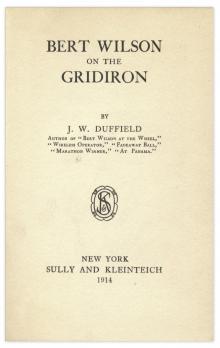 Bert Wilson, Marathon Winner
Bert Wilson, Marathon Winner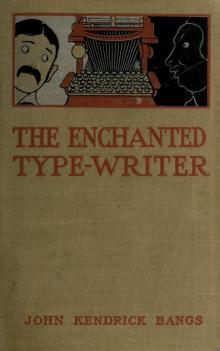 The Enchanted Typewriter
The Enchanted Typewriter The Lance of Kanana: A Story of Arabia
The Lance of Kanana: A Story of Arabia Coffee and Repartee
Coffee and Repartee The Idiot at Home
The Idiot at Home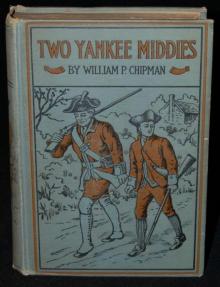 Budd Boyd's Triumph; or, The Boy-Firm of Fox Island
Budd Boyd's Triumph; or, The Boy-Firm of Fox Island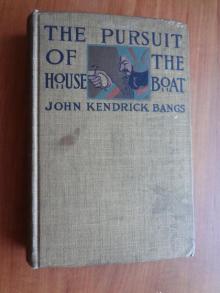 The Pursuit of the House-Boat
The Pursuit of the House-Boat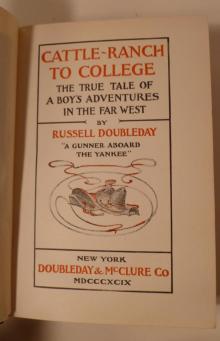 Cattle-Ranch to College
Cattle-Ranch to College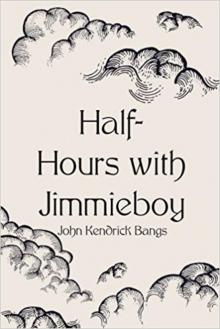 Half-Hours with Jimmieboy
Half-Hours with Jimmieboy Bikey the Skicycle and Other Tales of Jimmieboy
Bikey the Skicycle and Other Tales of Jimmieboy Toppleton's Client; Or, A Spirit in Exile
Toppleton's Client; Or, A Spirit in Exile Mollie and the Unwiseman
Mollie and the Unwiseman The Inventions of the Idiot
The Inventions of the Idiot Andy the Acrobat
Andy the Acrobat In Camp With A Tin Soldier
In Camp With A Tin Soldier Angel over the Right Shoulder
Angel over the Right Shoulder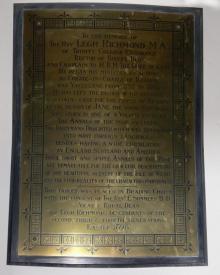 Annals of the Poor
Annals of the Poor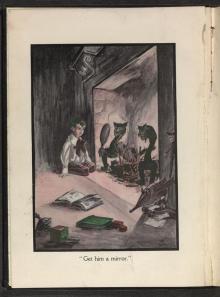 Andiron Tales
Andiron Tales Andy at Yale
Andy at Yale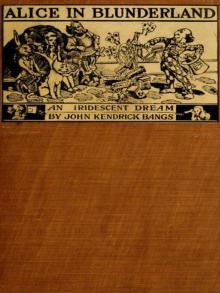 Alice In Blunderland
Alice In Blunderland